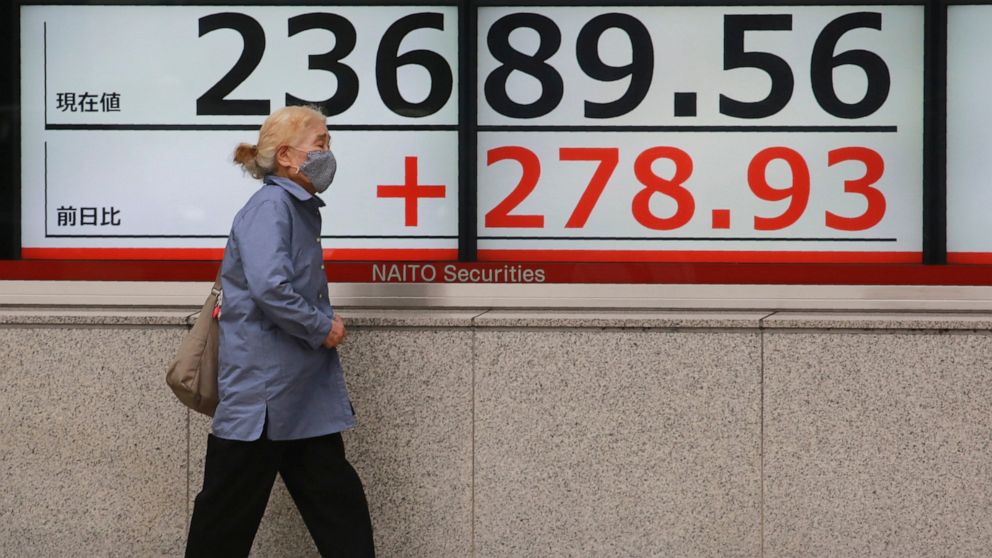Asian shares lifted by stronger China growth numbers
Shares have advanced in Asia after China reported its economy grew at a 4.9% annual pace in the last quarter, as consumer spending and manufacturing recovered from the downturn earlier this year
Shares advanced in Asia on Monday after China reported its economy grew at a 4.9% annual pace in the last quarter, with consumer spending and industrial production rising to pre-pandemic levels.
Japan’s Nikkei 225 led the gains, adding more than 1%.
China was the first country to suffer coronavirus outbreaks and the first major economy emerge from the pandemic and begin reopening from pandemic shutdowns. After contracting 6.8% in the first quarter of this year the economy grew 3.2% in the April-June quarter.
Both the annual growth and a 2.7% quarterly expansion were weaker than expected. Still, the recovery of Asia’s largest economy is good news for other countries that rely heavily on trade with China, including Japan. It reported Monday that its exports fell at a slower pace in September from a year earlier, partly thanks to higher demand from China.
The Nikkei 225 index added 1.1% to 23,671.13 while Hong Kong’s Hang Seng climbed 0.9% to 24,598.96. In South Korea, the Kospi edged 0.2% higher to 2,346.74, while the S&P/ASX 200 in Australia surged 0.9% to 6,229.40.
Thailand’s stock benchmark dropped 1.8% as political protests that have rocked Bangkok in recent days spread to at least a dozen provinces outside the capital.
Shares rose in India and Southeast Asia. New Zealand’s benchmark was flat after Prime Minister Jacinda Ardern handily won a second term in Saturday’s election. Ardern’s liberal Labour Party took a solid majority, winning 49% of the vote and crushing the conservative National Party, which got 27%.
The Shanghai Composite index shed early gains, falling 0.7% to 3,312.67 as investors logged profits on the expectation that the data have doused the chances for major stimulus measures that might help boost markets.
The National Bureau of Statistics reported that industrial production rose 5.8% in July-September over the same quarter last year, a marked improvement over the first half’s 1.3% contraction.
Retail sales rose 0.9% over a year earlier, up from a 7.2% contraction in the first half, when consumers already anxious about a slowing economy and a tariff war with Washington tightened their belts.
Meanwhile, hopes for new stimulus for the U.S. economy were muted, with House Speaker Nancy Pelosi saying time is running out to get measures passed before the Nov. 3 election.
Wall Street closed out a choppy week of trading with more of the same Friday, as a late-afternoon stumble led U.S. stock indexes to a mixed finish.
The S&P 500 ended the day just a fraction of a point higher at 3,483.81. The Dow Jones Industrial Average gained 0.4%, to 28,606.31. The Nasdaq fell 0.4% to 11,671.56, while the Russell 2000 index of small-cap stocks dropped 0.3% to 1,633.81.
Big Tech and energy companies fell while health care and industrial stocks rose.
The mixed performance matched the mixed data: the U.S. government reported that retail sales rose in September for the fifth straight month, while the Federal Reserve said U.S. industrial production had its weakest showing since the spring.
Stock indexes have recouped most of their losses from a swoon as talks between Democrats and Republicans on an economic stimulus package failed to deliver results. Investors have been hoping that Washington would provide more financial support for the economy since July, when a $600-a-week extra benefit for the unemployed expired.
Rising coronavirus caseloads across the globe have left investors cautious as governments impose restrictions to contain outbreaks.
The 10-year Treasury yield rose to 0.77% from 0.74%.
U.S. benchmark crude oil rose 10 cents to $41.22 per barrel in electronic trading on the New York Mercantile Exchange. It gave up 12 cents on Friday to $41.12 per barrel. Brent crude, the international standard, picked up 9 cents to $43.02.
In currency dealings, the dollar rose to 105.46 Japanese yen from 105.40 on Friday. The euro slipped to $1.1708 from $1.1717.
———
AP Business Writer Joe McDonald in Beijing contributed.
![]()


